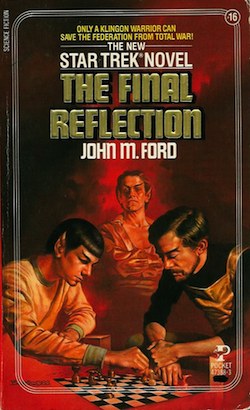Love them or loathe them, tie-in novels are written for fans of the media to which they tie in. They have the same problems and advantages as books set in actual history—the writers can’t change what canonically happened and the readers are already invested in the characters and the universe. This is what’s good about them, for those readers, but it makes them odd to read if you are a fan of the author and not of the series.
My interest in Star Trek is minute, and my knowledge of Star Trek is on the level of “I haven’t been living under a rock for the last forty years.” (I think I may have mentioned here before that I hate TV.) There’s probably nobody who might plausibly pick up this book, nobody who might plausibly read this post, who doesn’t know the names Kirk, Spock, Enterprise, Klingons. Star Trek is just that much part of the zeitgeist. But reading The Final Reflection as someone with only that level of knowledge is odd. When you read a book set in the aftermath of WWII, the author doesn’t need to stop to explain the significance of uranium, and similarly here Ford doesn’t feel his audience needs him to stop to explain the significance of dilithium. It makes the book unbalanced—it’s a strange blip when the text is cueing you to get excited to meet the grandfather of a character whose name seems only vaguely familiar.
For me, The Final Reflection would be a better book if it were set in an original universe. But it’s still an excellent book—it’s one of those rare tie-in books that’s good even if you’re not a fan of the show and it must be world-shatteringly marvellous if you are. The important thing here is a tightly paced and fascinating story about warrior aliens and the difference between tactics and strategy.
I have been told by fans that Ford invented Klingon culture in this book, and if this is so, he did a very good job. This story is told entirely from the point of view of Klingons. They are aliens of a kind who seem designed to be enemies to civilization—they are slavers, they consider war and piracy the only really important things, they torture prisoners for fun and information. You wouldn’t think anybody could make them sympathetic. But Ford does it—he gives us psychologically plausible Klingons, and a psychologically plausible Klingon culture, and he shows it to us from the inside. They play live action chess-like games where the players are children and can really die or be maimed, and Ford shows us this from the point of view of one of those children, desperately proud of his position. The whole culture—their position on genes, on lines, on aliens, and their internecine strife—is of a piece. They are Spartan, uber-Spartan, and they are absolutely sure it is their destiny to fight well and continue to fight past death in the Black Fleet. They’re never nice, but Ford makes them realistic and comprehensible.
The novel is a story of a complex and subtle revenge, and re-reading it I was able to appreciate that properly. Ford’s plots are often sufficiently subtle to be surprising on a first reading and much more satisfying when revisited. I find the Federation underdeveloped—because Ford quite reasonably expected readers who already knew all about—and that makes it seem thin and sketchy compared to the richness of Klingon culture.
The plot is deceptively simple. Krenn, who we first see as Vrenn, defending his square in the game of klin zha, is an orphan who is adopted by a Thought Admiral—a strategic genius, who teaches Krenn all the variants of all the strategy games. Krenn later understands aliens because he understands their games. He rises through the ranks, and avenges his adoptive father by playing the mirror klin zha game out in the real universe. What makes it so great is the complex emotional and cultural reality that goes along with that.
If you’re a Star Trek fan you’ve probably already read this book. If you’re not but you like interesting complex SF, you should definitely try it.
Jo Walton is a science fiction and fantasy writer. She’s published two poetry collections and nine novels, most recently Among Others, and if you liked this post you will like it. She reads a lot, and blogs about it here regularly. She comes from Wales but lives in Montreal where the food and books are more varied.










